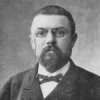Henri Poincare

Henri Poincare
Jules Henri Poincaréwas a French mathematician, theoretical physicist, engineer, and a philosopher of science. He is often described as a polymath, and in mathematics as The Last Universalist by Eric Temple Bell, since he excelled in all fields of the discipline as it existed during his lifetime...
NationalityFrench
ProfessionMathematician
Date of Birth29 April 1854
CountryFrance
science night thinking
Thought is only a flash between two long nights, but this flash is everything.
spiritual believe thinking
Doubting everything and believing everything are two equally convenient solutions that guard us from having to think
prayer rain thinking
Why is it that showers and even storms seem to come by chance, so that many people think it quite natural to pray for rain or fine weather, though they would consider it ridiculous to ask for an eclipse by prayer.
thinking law doubt
It may be appropriate to quote a statement of Poincare, who said (partly in jest no doubt) that there must be something mysterious about the normal law since mathematicians think it is a law of nature whereas physicists are convinced that it is a mathematical theorem.
thinking use affirmation
All that is not thought is pure nothingness; since we can think only thoughts, and all the words we use to speak of things can express only thoughts, to say there is something other than thought is therefore an affirmation which can have no meaning.
eye past thinking
The advance of science is not comparable to the changes of a city, where old edifices are pitilessly torn down to give place to new, but to the continuous evolution of zoologic types which develop ceaselessly and end by becoming unrecognisable to the common sight, but where an expert eye finds always traces of the prior work of the centuries past. One must not think then that the old-fashioned theories have been sterile and vain.
means necessary neither nor
Thus, be it understood, to demonstrate a theorem, it is neither necessary nor even advantageous to know what it means . . . .
american-journalist relations remain replace
Thus, they are free to replace some objects by others so long as the relations remain unchanged.
american-journalist
No more than these machines need the mathematician know what he does.
american-journalist governed phenomenon succeeding
If that enabled us to predict the succeeding situation with the same approximation, that is all we require, and we should say that the phenomenon had been predicted, that it is governed by the laws.
avoiding consists infinite invention useful useless
Invention consists in avoiding the constructing of useless contraptions and in constructing the useful combinations which are in infinite minority. To invent is to discern, to choose.
american-journalist cannot cause determines due effect escapes notice
A very small cause which escapes our notice determines a considerable effect that we cannot fail to see, and then we say that the effect is due to chance.
american-journalist believe both convenient equally necessity
To doubt everything, or, to believe everything, are two equally convenient solutions; both dispense with the necessity of reflection.
american-journalist species
It has adopted the geometry most advantageous to the species or, in other words, the most convenient.